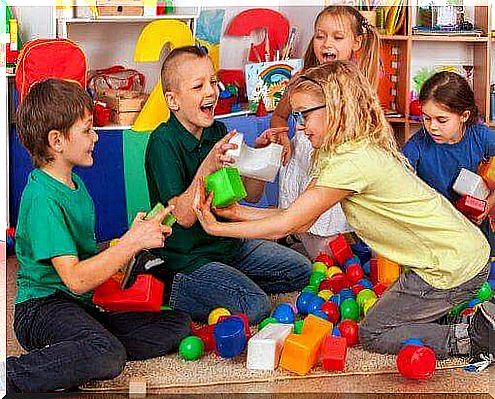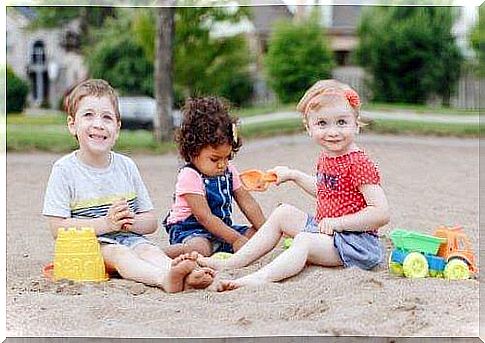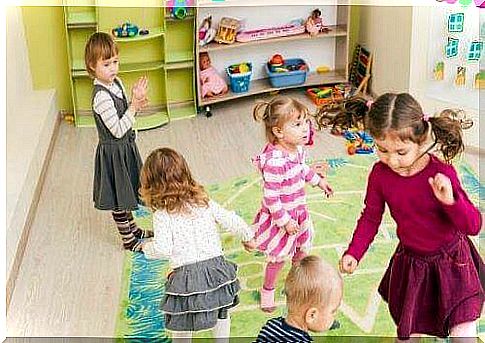Teaching Social Skills: Empathy And Self-confidence

Teaching children social skills contributes to emotional health and good conflict resolution. The basis of these competencies is empathy and self-confidence, which is rooted in good self-esteem.
Most importantly, teachers and educators can help students acquire and refine these social skills. The first step in teaching social skills is that adults also apply such skills in practice.
Thus, according to this recommendation, all parents and relatives should also reconsider their own ways of engaging with the people around them.
Why teach children social skills?
It is obvious that children have different ways of dealing with others, whether they are at home or with groups of children who interact.
Take a few moments each day to reflect together as a group on some of the ways we choose to tackle society. This will make the teaching of social skills really meaningful for the children.
1. What are social skills and why do we need them?
A great way to introduce this topic to children is to analyze how social skills help improve our collective lives.
Depending on the age of the children, you can complete this step using games, stories, movies or even reading lessons for teenage children.
2. Introduce one ability at a time
It does not do much good to introduce a whole lot of social skills at once. The ideal method is to select and focus on one skill at a time. Then you can concentrate your activities or lesson plan around this skill.
For example, you can dedicate a week to thinking about “what it means to share and that others share with me.” In this way, what the curriculum covers is absorbed more deeply, and each child develops their own personal way of applying these abilities.
Think deeply about each of the social skills
There are different ways to teach children social skills. The key is that it is the children themselves who must reflect on this autonomously. They should be allowed to express their opinions free of judgment.
A good exercise is to use a two-column schedule. The column on one side shows all the social abilities. In the second column you can have a list of examples of social practices that the children themselves suggest.

4. Practice what they are learning
Of course, you should adjust the way you present the information to suit the age group. Practicing what has been learned is the best way for children to truly absorb it and strengthen their social skills. Role-playing and conversation games are excellent resources for doing this.
5. Take breaks to reflect
Taking a break after learning a social skill allows children to transfer what they have learned to real-life situations. In this way, when you come across cases where a child is actively using a social skill that he or she has been taught, you can together reflect on the ways in which the social skills are used.
It is helpful to invite children to reflect on their own behavior. They can also examine their thoughts both individually or together in a group.
Some social skills, such as the ability to negotiate, can be very complex. But they have a positive impact on children’s development, even in the classroom and at school.
Teaching social skills requires a positive self-image and self-confidence
Another aspect used to teach children social skills has to do with the image you have of yourself. Every boy and girl must know how to value themselves, love themselves and defend their rights and interests.
If there is any doubt about how to learn to value oneself, we can summarize the best approach as: “Be the best example you can be.” It is also good to consider the following:
- It is not helpful to compare children with each other
- Children need quality time
- Children need different opportunities to practice their skills
- Their efforts and strengths should be recognized
- Their autonomy should be promoted
In short, being confident has to do with ethical principles, and requires that you value your own rights and recognize the rights of others. In fact, for very young children, valuing their own rights usually results in a sudden loud scream that scares the offender.

Conclusion
When children gain social skills, it is good to reflect on the importance of being confident and having a positive role model. Having control over your own emotions requires the ability to be confident. In addition, self-confidence is also important for engaging in conflict resolution, negotiation and persuasion.
Teaching social skills to children is also a challenge for adults. Starting this learning process early and from home is the best gift you can give them.
The basic values are to teach children to be autonomous and engage in respectful dialogue. In addition, teaching social skills to children also requires working carefully to identify, express, and respond to their emotions.








